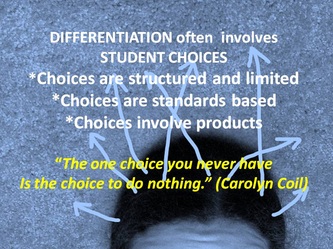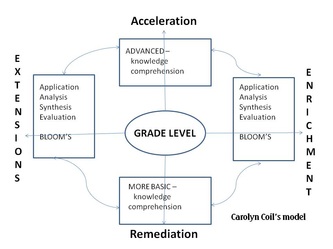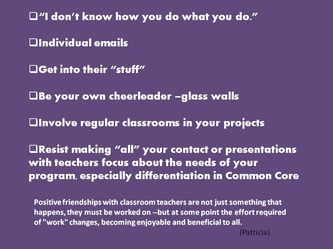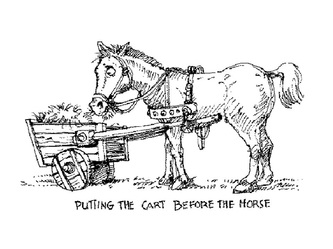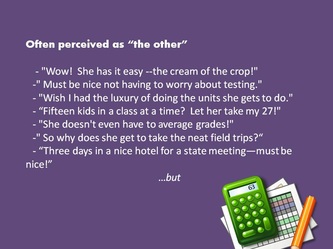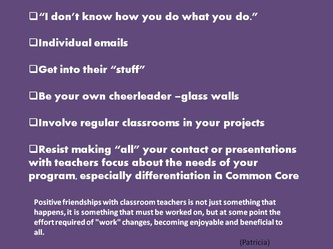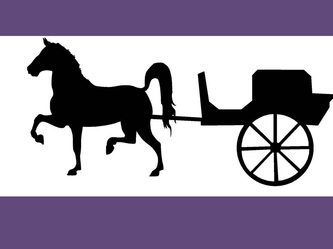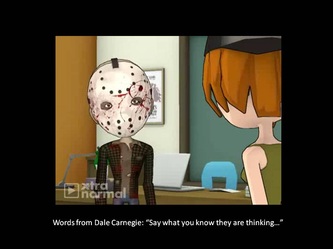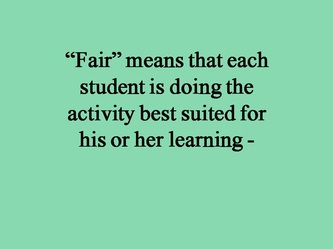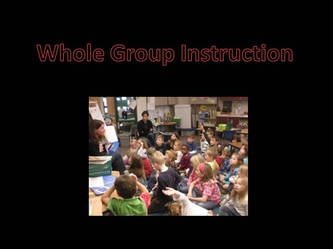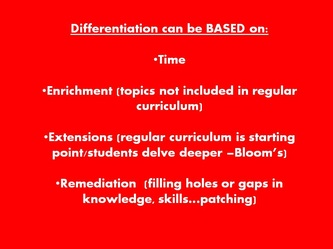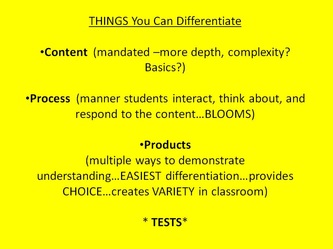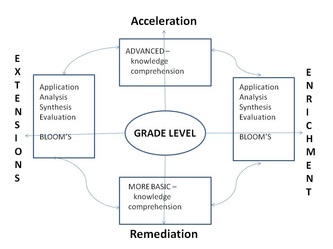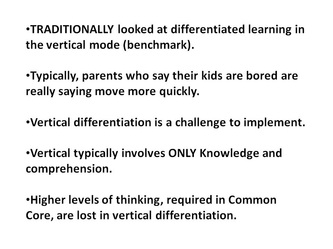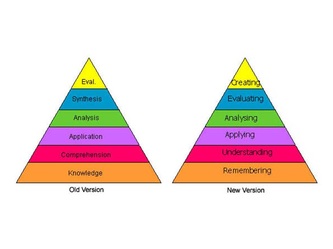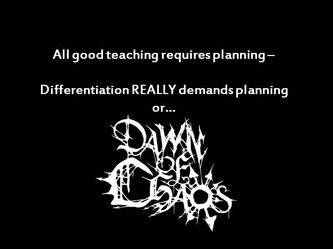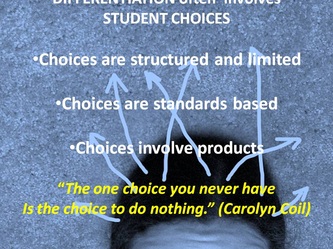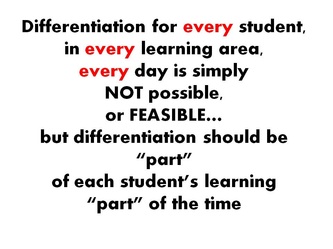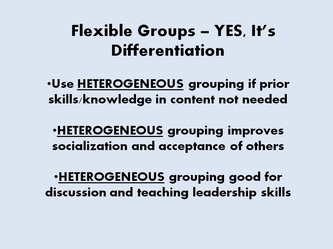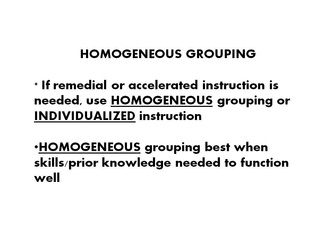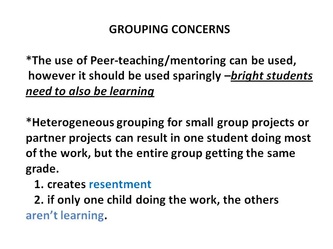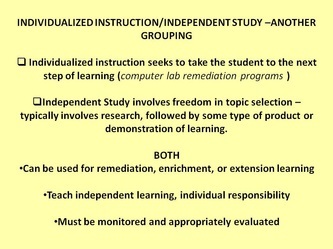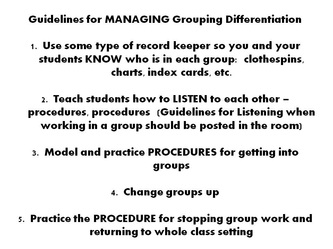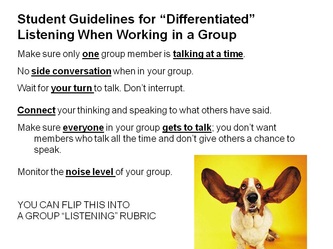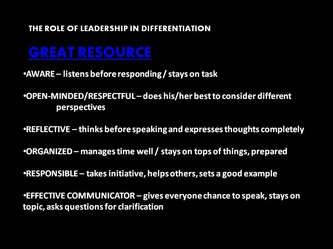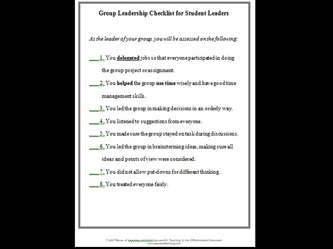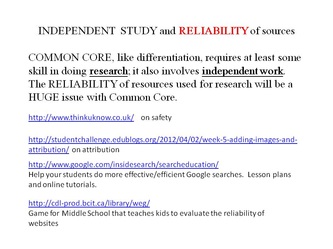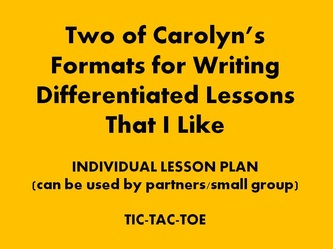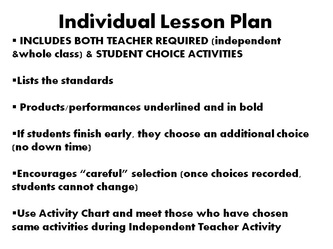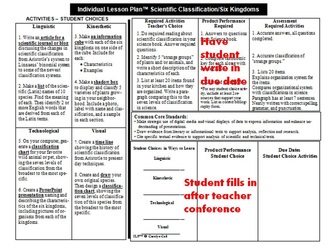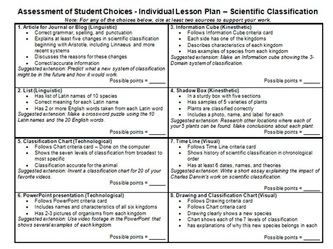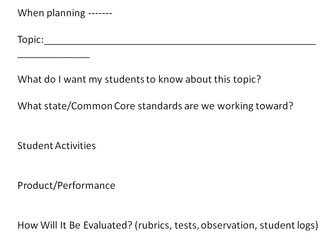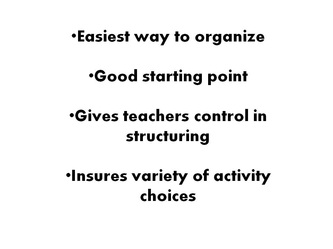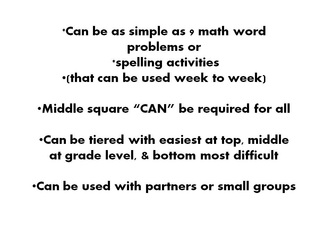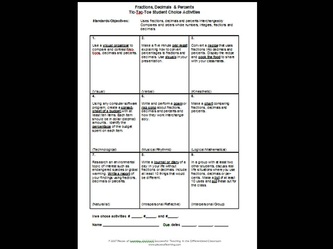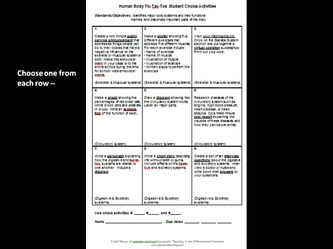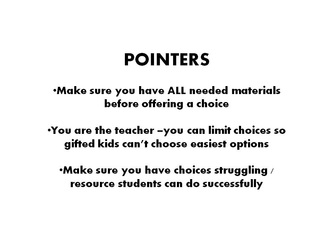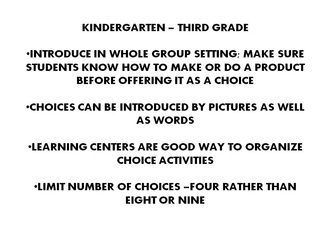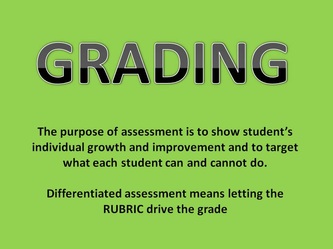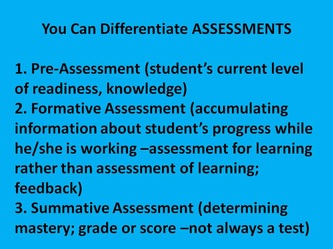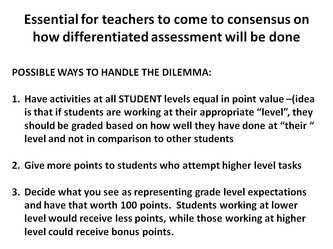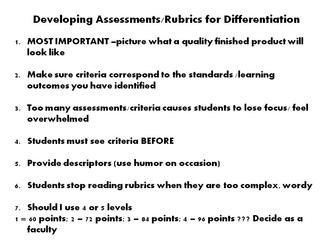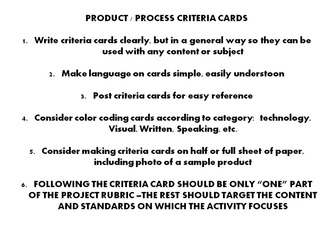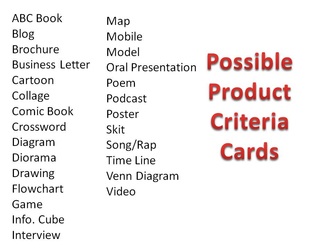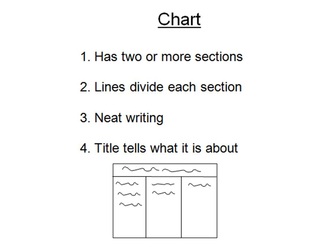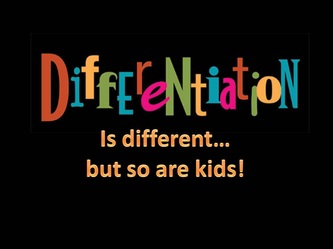The following presentation is largely based on the work of Carolyn Coil. I was privileged to hear her speak at a day-long presentation at the 2012 AGATE Conference in Hot Springs. Her insight and the incredible work she dedicated to the topic of differentiation is amazing. I quickly purchased two of her resource books on the topic, which also included CDs with forms that could be adapted to teacher created lessons. Wonderful resource!
I strongly recommend the purchase of her materials which can be found at:
http://www.carolyncoil.com/ and at
Pieces of Learning
The two books I use are:
(...no, I do not get paid by Carolyn --I simply believe in sharing something that's good!)
the two "SILLY" videos (the exaggeration does make a good point...) can be found at:
http://www.youtube.com/watch?v=c8Mr-QUhZ9A
http://www.youtube.com/watch?v=kn8faeuQjE0&feature=related
Below are separate image slides from the presentation if you care to utilize them in creating your own "Differentiation" workshop for your district's teachers --of course, you won't want the slides that are directed toward US! : )
G.T. Facilitators: WORKING WITH CLASSROOM TEACHERS -- (Patricia Hesse)
As G.T. teachers we are often perceived as and feel as "the other." After all, there typically is only one G.T. teacher in a building and even in large schools where there may be two, we are pretty much isolated beings. I can imagine what many teachers must think because I remember being them at one time:
- "Wow! She has it easy --the cream of the crop!"
-" Must be nice not having to worry about testing."
- "Wish I had the luxury of doing the units she gets to do."
- "Three days at a nice hotel for the state G.T. meeting?"
- "Twelve kids in a class at a time? Let her take my 25!"
- "She doesn't even have to average grades!"
-" So why does she get to take the neat field trips?"
Need I go on? So... how can we change that perception, and why should we? On the surface what many teachers think about us appears true. As G.T. teachers we quickly defend ourselves with that magic word, "but." The cream of the crop are a real challenge and have their share of prickly thorns. Testing? We are being held more and more accountable for, not just what our students do, but the entire student population. Don't they know that? Our "fun" units aren't found in any idea book, but require countless hours of research, planning, locating, and arranging. I admit that AGATE is pretty fun --I'll give 'em that one; however, I always leave refreshed, with a head full of ideas. The smaller class size is nice, however we are eager to work with all kids who need that extra something our programs offer. The higher level and increased expectation for response to learning are not feasible for all. Averaging grades is a chore --but so is keeping up with documentation and all the ins and outs of validating what we do. I think each of us would agree that more field trips for all students would be wonderful, however the trips we do go on are an important part of our curriculum and not just something we do for fun. So what do we do? First of all, we throw away the score card -- the us verse them.
We need classroom teachers on our team, and they need us. I continually tell my teachers: " I don't know how you do what you do." I truly MEAN IT --the demands of the regular classroom teacher are overwhelming. It is crucial to tell them that you know how hard their job is. Get involved with what they are doing and do it eagerly. Let them see you as part of the school and not apart from what they do. Use the website resource and email them sites you think they might want to use. Let them know that you are trying to help them. Find out what teachers are doing in their classrooms and share what you have. Attend special project presentations in the regular classroom any time you can. This shows that you value what classroom teachers do in their rooms. Comment on the hall displays outside each classroom --let teachers see you stopping and taking time to really appreciate their efforts. Send individualized emails --not those that go to everyone. Make sure you email is written so that the receiving teacher notices you composed it just for her. Remember to thank classroom teachers for the skills your G.T. kids have that allow them to go beyond --skills they learned in the regular classroom. And...
Be your own cheerleader so teachers have SPECIFIC knowledge of how hard you work. The big buzz word in the media today is "transparency." Live in a glass-walled classroom where everyone is aware of your responsibilities to the state department. Share your documentation and your units; let your teachers see what you are doing! Find ways to include regular classrooms within your G.T. projects; G.T. kids can share what they are doing and plan activities for their classmates. Everyone benefits.
Friendship is not just something that happens, it is something that must be worked on, but at some point the effort required of "work" changes and becomes enjoyable.
In May our school had an Awards Assembly where students were recognized for their academic achievements and participation in sports programs. Toward the end of the assembly, the P.T.O. president presented the first Weiner Elementary Teacher of the Year Award which was determined by a vote of the elementary faculty. I was simultaneously stunned and humbled when I heard my name called. I jokingly said they must have decided to give it to the oldest teacher, however I was so proud. There are few things more gratifying than recognition from your peers --they know a side of you even your family doesn't know. They know what you do, how you interact, how you handle difficulty, and how much you care about what you do.
The photographs of the 25 special women above speak to why we need classroom teachers on our team. They have much to offer --support, encouragement, knowledge, and above all ...friendship. I am blessed to work with such an exceptional group of professionals. They have taught me much.
- "Wow! She has it easy --the cream of the crop!"
-" Must be nice not having to worry about testing."
- "Wish I had the luxury of doing the units she gets to do."
- "Three days at a nice hotel for the state G.T. meeting?"
- "Twelve kids in a class at a time? Let her take my 25!"
- "She doesn't even have to average grades!"
-" So why does she get to take the neat field trips?"
Need I go on? So... how can we change that perception, and why should we? On the surface what many teachers think about us appears true. As G.T. teachers we quickly defend ourselves with that magic word, "but." The cream of the crop are a real challenge and have their share of prickly thorns. Testing? We are being held more and more accountable for, not just what our students do, but the entire student population. Don't they know that? Our "fun" units aren't found in any idea book, but require countless hours of research, planning, locating, and arranging. I admit that AGATE is pretty fun --I'll give 'em that one; however, I always leave refreshed, with a head full of ideas. The smaller class size is nice, however we are eager to work with all kids who need that extra something our programs offer. The higher level and increased expectation for response to learning are not feasible for all. Averaging grades is a chore --but so is keeping up with documentation and all the ins and outs of validating what we do. I think each of us would agree that more field trips for all students would be wonderful, however the trips we do go on are an important part of our curriculum and not just something we do for fun. So what do we do? First of all, we throw away the score card -- the us verse them.
We need classroom teachers on our team, and they need us. I continually tell my teachers: " I don't know how you do what you do." I truly MEAN IT --the demands of the regular classroom teacher are overwhelming. It is crucial to tell them that you know how hard their job is. Get involved with what they are doing and do it eagerly. Let them see you as part of the school and not apart from what they do. Use the website resource and email them sites you think they might want to use. Let them know that you are trying to help them. Find out what teachers are doing in their classrooms and share what you have. Attend special project presentations in the regular classroom any time you can. This shows that you value what classroom teachers do in their rooms. Comment on the hall displays outside each classroom --let teachers see you stopping and taking time to really appreciate their efforts. Send individualized emails --not those that go to everyone. Make sure you email is written so that the receiving teacher notices you composed it just for her. Remember to thank classroom teachers for the skills your G.T. kids have that allow them to go beyond --skills they learned in the regular classroom. And...
Be your own cheerleader so teachers have SPECIFIC knowledge of how hard you work. The big buzz word in the media today is "transparency." Live in a glass-walled classroom where everyone is aware of your responsibilities to the state department. Share your documentation and your units; let your teachers see what you are doing! Find ways to include regular classrooms within your G.T. projects; G.T. kids can share what they are doing and plan activities for their classmates. Everyone benefits.
Friendship is not just something that happens, it is something that must be worked on, but at some point the effort required of "work" changes and becomes enjoyable.
In May our school had an Awards Assembly where students were recognized for their academic achievements and participation in sports programs. Toward the end of the assembly, the P.T.O. president presented the first Weiner Elementary Teacher of the Year Award which was determined by a vote of the elementary faculty. I was simultaneously stunned and humbled when I heard my name called. I jokingly said they must have decided to give it to the oldest teacher, however I was so proud. There are few things more gratifying than recognition from your peers --they know a side of you even your family doesn't know. They know what you do, how you interact, how you handle difficulty, and how much you care about what you do.
The photographs of the 25 special women above speak to why we need classroom teachers on our team. They have much to offer --support, encouragement, knowledge, and above all ...friendship. I am blessed to work with such an exceptional group of professionals. They have taught me much.

